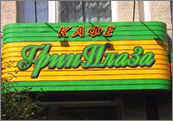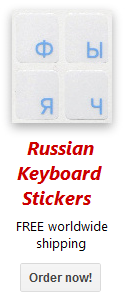 FR FR |
About us | Home | User agreement | Link to us |
The Genitive Case
The genitive case is used in the sentences like "Каковы́ сво́йства ..." (What are the properties of ...). The English equivalent of the genitive case is the preposition "of". The nouns in the genitive answer such questions as Кого́? Чего́? (Of whom? Of what?).
| Сво́йства чего́? | Сво́йства мета́лла. | - | The properties of what? | The properties of metal. |
| Это бе́рег чего́? | Это бе́рег реки́. | - | This is the bank of what? | This is the bank of the river. |
| Это кни́га чья? | Это кни́га Ле́ны. | - | Whose this book is? | This is Lena's book. |
The main role of the genitive is to show where the person or thing belongs to or what it relates to. For example: кры́ша до́ма (the roof of the house), па́чка ча́я (the pack of tea).
|
Remember: Numerals 2, 3, 4 and their compounds are always followed by the genitive singular case. Example: два
до́ма, |
Usage of the Genitive case
The genitive is usually used with the following prepositions: без, для, до, из, из-за, из-под, кро́ме, на, от, с, со, у, о́коло, вокру́г, недалеко́ от, позади́, напро́тив, посреди́, ми́мо, вдоль. However you should know that the genitive is not the only case used with these prepositions.
| без воды́ | without water | |
| для Ва́ни | for Vanya | |
| до окна́ | to the window | |
| для ча́я | for tea |
The genitive is used after the verbs проси́ть, хоте́ть, тре́бовать, иска́ть, ждать, достига́ть, жела́ть, боя́ться with nouns designating abstract and indefinite objects. For example:
| Учи́тель про́сит внима́ния. | The teacher calls for attention. | |
| Ро́зы боя́тся хо́лода. | The roses are afraid of cold. |
The genitive is also used after the words нет, не бы́ло, не бу́дет. For example:
| У него́ не было де́нег. | He did not have money. | |
| У меня́ нет бра́та. | I do not have a brother. |
How to form the Genitive case
Forming the genitive of Russian nouns is pretty easy. You will need to remove the last vowel from the nominative singular of a noun and add one of the following endings: -а, -я, -и, -ы (singular); -ов, -ев, -ей (plural). If the noun ends in a consonant, just add the appropriate ending. This process is summed up in the tables below.
The Genitive of singular nouns
| Nominative | Remove | Add | Genitive | |
| masculine | брат чай |
-- й |
а я |
бра́та ча́я |
| neuter | окно́ мо́ре |
о е |
а я |
окна́ мо́ря |
| feminine | печь вода́ |
ь а |
и ы |
пе́чи воды́ |
Explanation of the table:
Add -а to masculine nouns ending in a hard consonant (брат) and neuter nouns ending in -o (окно́).
Add -я to masculine nouns ending in -й, -ь (чай, учи́тель) and neuter nouns ending in -е, -ие (мо́ре, ору́дие).
Add -и to feminine nouns ending in -я, -ь (печь).
Add -ы to feminine nouns ending in -a (вода).
Exception 1: Because of the spelling rules, you should use the ending -и instead of -ы in feminine nouns ending in hard к, г, х or ж ш. For example: де́вочка - де́вочки, кни́га кни́ги.
Exception 2: Because of the spelling rules, you should use the ending -а instead of -я in masculine nouns ending in ч, щ. For example: ключ - ключа́, товарищ - това́рища.
Exception 3: Masculine nouns ending а, я follow the same pattern as feminine nouns ending in а, я. For example: па́па - па́пы.
The Genitive of plural nouns
| Nominative singular | Remove | Add | Genitive plural | |
| masculine | мост брат край трамва́й учи́тель |
-- -- й й ь |
ов ьев ёв ев ей |
мосто́в бра́тьев краёв трамва́ев учителе́й |
| neuter | окно́ мо́ре |
-- -- |
-- й |
о́кон море́й |
| feminine | печь коса́ ста́я |
ь -- -- |
ей -- -- |
пече́й кос стай |
Explanation of the table:
Add -oв to masculine nouns ending in a consonant.
Add -ев to masculine nouns ending in -й. Add -ёв to one-syllable nouns like край, чай. Exceptions are nouns like брат, лист which get the ending -ьев.
Add -ей to feminine nouns ending in -ь and masculine nouns ending in -ь, ж, ч, ш, щ.
Add -й to neuter nouns ending in -e.
Neuter nouns ending in -o and feminine and masculine nouns ending in -а, -я lose their endings.
Got questions?
Ask them in the Russian Questions and Answers — a place for students, teachers and native Russian speakers to discuss Russian grammar, vocabulary, pronunciation, and other aspects of the Russian language.
Copyright 2001-2026 MasterRussian.com | Privacy Policy | Contact Us
 Russian Lessons
Russian Lessons
- Russian alphabet
- Names of letters
- Russian Q&A new
- Pronunciation: Cons.
- Pronunciation: Vowels
- Noun Gender/Number
- Cases of Nouns
- Russian Greetings
- Personal Pronouns
- Learning Russian
- 1000 Common Words
- 500 Russian Verbs
- Top Russian Nouns
- » All lessons
- » Guest lessons
 Browse Topics
Browse Topics
- Start learning Russian
- Forum
- Bookstore
- Dictionaries
- Russian - basic
- Russian - adv
- Pronunciation
- Russian Blog new
- Reading
- Test & quizzes
- Translation
- Verbs
- Verb Conjugations
- Russian numbers
- Russian Tests new
- Vocabulary
- Writing
- Folk music
- Fun stuff
- Leo Tolstoy
- Learner's lore
- Literature
- Personal blogs
- Picture Dictionary new
- Proverbs
- Publications
- Radio & TV
- Russian culture
- Schools in Russia
- Russian Words
- Russian names
- Software
- Russian Words iPhone
Clicks the "Like" button below to get daily updates on Facebook!
Click "Add to circles" to learn Russian on Google+

Search MasterRussian

English » Russian dictionary

WORD OF THE DAY
![]() RSS
|
iGoogle
|
My Yahoo!
RSS
|
iGoogle
|
My Yahoo!
Meaning: head, mind, brains
Pronunciation: [gah-lah-VAH]
Learn Russian words! »
TODAY'S STREET SIGN

Russian: Кафе ''Грин Плаза''
English: Green Plaza cafe
FOLLOW US ON TWITTER

MasterRussian on Twitter


